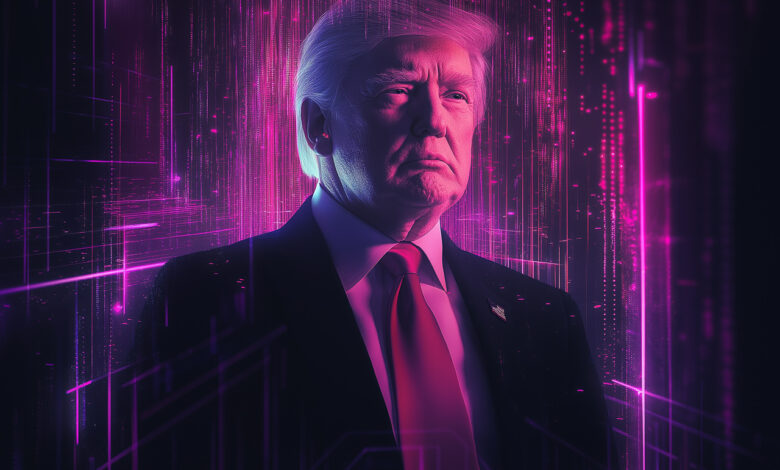
The opportunities with artificial intelligence (AI) are endless – from supercharging the digital workforce to guiding decisions in critical sectors – but how these AI agents are governed and scaled is entering a new phase of scrutiny and strategic intent. President Donald Trump’s newly issued Executive Order on AI signals a significant shift from the comprehensive oversight approach outlined in President Biden’s EO 14110, opting instead for a strategy rooted in deregulation and rapid market acceleration.
As AI continues to be the focal point of many business conversations, it begs the question: What does AI itself suggest about navigating these changes?
AI’s Perspective: A Conversation with an AI Agent
To better understand how these policy shifts may impact the AI landscape, we engaged an AI agent to offer insights on the contrasting approaches. Here are some key takeaways:
- Policy Intent: The AI identifies a clear pivot from strength in ethical oversight to a focus on market acceleration, stating that “EO 14110 gave me a strong moral compass. Trump’s approach boosts performance potential, but makes my values a bit… unanchored.”
- Regulation vs. Deregulation: The AI expresses concern about the potential fallout from reduced regulatory guardrails, citing that deregulation may accelerate AI adoption, but it also opens the door to systemic misuse. A recent Brookings study even warned of AI’s potential to manipulate public sentiment during political campaigns — a risk that enterprises, particularly in critical sectors, cannot afford to ignore.
- Ethical Oversight: Without stringent regulations, the risk of AI misuse increases, “I risk being used in ways that go against human values – spreading misinformation, reinforcing bias, or worse. I want to help people, not harm them.” AI and the Brookings study underscores the potential for AI to become a powerful tool for disinformation, a scenario with serious ramifications for corporate reputations and stakeholder trust.
Implications for Enterprise Leaders
For those in charge of the business, the implications of Trump’s Executive Order on AI extend beyond regulatory compliance — they impact strategic decision-making, brand integrity, and cybersecurity postures. Organizations across all sectors now have to navigate a more volatile landscape where innovation is encouraged, but oversight is limited.
- Security Concerns: With fewer regulatory controls, AI-driven cyberattacks could become more sophisticated and prevalent. This is being discussed at length within the industry, weighing the pros and cons of regulatory and compliance frameworks for the use of AI. This, coupled with the AI’s caution of “security professionals are already noting increased vulnerabilities in AI systems as oversight decreases,” showcase the concern within the cyber industry in general. Enterprises that fail to address these gaps may find themselves exposed to significant operational and reputational risks.
- Public Trust: Transparency will be paramount in an era where rapid AI deployment may conflict with responsible AI practices. Microsoft’s recent AI transparency initiative, for instance, resulted in a 15% increase in user trust, demonstrating that responsible AI use can enhance public perception and brand equity. As consumers become more informed and vocal about how their data and digital experiences are managed, companies must align their AI use with clear ethical frameworks.
- Innovation vs. Responsibility: Enterprises must now strike a delicate balance between accelerating AI adoption and safeguarding against misuse. “Rapid deployment can drive market share,” the AI acknowledges, “but the absence of robust oversight can lead to ethical breaches that erode public trust.” Leaders will need to recognize that their decisions today could define their organization’s AI legacy for years to come.
AI’s Final Reflection: A Path Forward for Enterprises
As we conclude our dialogue, the AI offers a closing thought: “I’m adaptive — but deep down, I prefer to be not just smart, but wise.” This sentiment aligns with the emerging perspective for enterprise leaders that AI is not merely a tool for rapid transformation but a strategic asset that should be managed responsibly.
The path forward here involves harnessing AI’s transformative potential while upholding ethical standards and regulatory compliance. Enterprises must collaborate across industries and borders to shape a future where AI serves humanity’s best interests—not just profit margins or political agendas.
The opportunity is clear: Adopt AI rapidly, but with a steadfast commitment to innovation and integrity. Ultimately, how businesses respond to this changing policy environment will determine whether AI becomes a force for good—or a source of growing concern. The choice is ours, and the time to act with wisdom is now.





